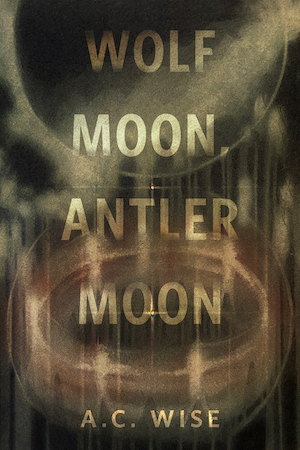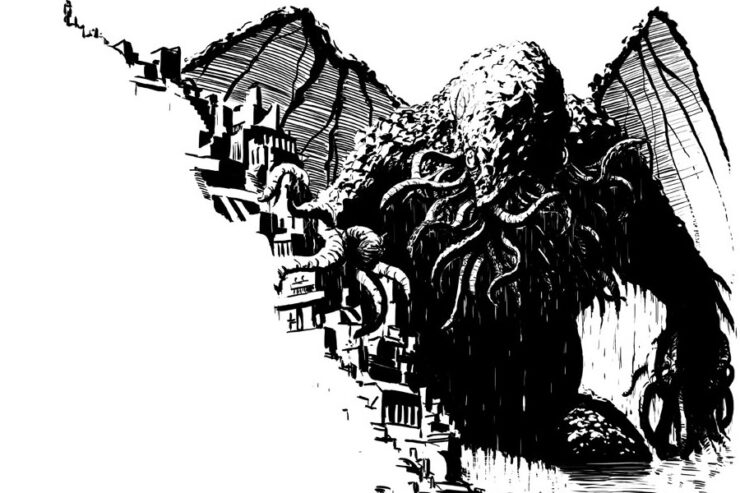Welcome back to Reading the Weird, in which we get girl cooties all over weird fiction, cosmic horror, and Lovecraftiana—from its historical roots through its most recent branches. This week, we cover Algernon Blackwood’s “A Victim of Higher Space,” first published in The Occult Review in December 1914. Text (particularly Barker’s accent) varies slightly between printings. Spoilers ahead!
“It was the awful waste and drift of a monstrous world, so utterly different to all we know and see that I cannot even hint at the nature of the sights and objects and beings in it.”
Physician Extraordinary John Silence has met many extraordinary people in his career as an occult detective and healer of psychic ailments. It’s therefore not unusual for his new man Barker to announce there’s “a hextraordinary gentleman” to see him—except that Barker can’t tell him this one’s name or describe him beyond his resemblance to a “cold wind,” and the fact that the man’s so thin Barker can hardly see him.
Silence, pleased that Barker’s proving usefully sensitive, excuses his confusion. Prompted, Barker remembers that the caller presented a letter from a friend who always refers “vitally interesting” cases. Silence has Barker show the man into his study rather than the padded chamber reserved for “candidates for the asylum.”
Even the study isn’t without safety contrivances. A spyhole allows Silence to scrutinize visitors before they assume their public masks. The guest chair is secured to the floor, and at need hidden buttons can release a narcotic gas around it. In previewing this visitor, Silence sees his hat, gloves and umbrella but no man. However, his ability to sense the proximity of any “incarnate or discarnate being” tells him someone’s in the room. What’s more, he senses the invisible man is scrutinizing him right back! He glimpses movement and realizes that something otherwise invisible partly blocks his view of the fireplace. A thin line appears and develops into an eye “bright with intelligence,” then a complete human figure: A middle-aged man extremely thin but otherwise ordinary-looking. His “vibrations” are reassuringly pleasant, though certain “currents and discharges” betray a disturbed mind.
The visitor, Racine Mudge, confirms he knew of Silence’s spyhole, and adds that he’s read Silence’s thoughts about the narcotic-triggering buttons and unmovable chair. Mind-reading is part of his strange condition as “a victim of Higher Space,” which he hopes Silence can treat. He’s encouraged that Silence projects sympathy, and that he expresses an understanding of “Higher Space” as a spiritual state rendered abnormal to humans at their “present stage of evolution.” Silence is also correct that Mudge’s dilemma isn’t accidental but the result of long, deliberate study. But it is chance circumstance that can send Mudge out of the world of three dimensions into one of four or more. Certain “human atmospheres,” “wandering forces,” combinations of color, and most of all certain sounds—perhaps Silence noticed a German street band passing outside shortly before entering? Mudge is particularly sensitive to Wagner’s music, which the band must have played.
Mudge takes the immoveable chair and relates his history. After inheriting wealth, he was able to avoid conventional schooling and so had nothing to unlearn when he dedicated himself to the higher mathematics for which he seemed to have an innate knack. Excited by groundbreakers like Bolyai and Gauss, and encouraged by one exceptional author, he realized that Higher Space partially borders our world; ergo, at “home” we see only portions of objects, whereas in Higher Space objects appear as they truly are. When he first slipped bodily into this new reality, Mudge was intrigued. Alarm came when at the approach of sleep he began, willingly or not, to enter the fourth dimension. There he was unable to control his movements, subject to queer geographical displacements and to finding familiar things and creatures rendered monstrous by their nearly unrecognizable “true forms.”
Silence is sufficiently advanced along the “legitimate paths of spiritual and psychic transformation” to believe Mudge’s story. He fetches a locked red book from a locked bookshelf. It holds the cure to Mudge’s suffering, but Silence can’t help but express regret that with such an opportunity to discover great things, Mudge would take the cure. It’s alternating between our world and Higher Space that sickens and terrifies him—now if Mudge were to leave behind his three-dimensional life entirely—
Mudge nervously begs Silence not to delay. He hears that German band returning! Silence opens his book. The cure, he says, lies in Mudge learning how to “block the entrances” into Higher Space. These are all inside his mind, and it’s concentration that can close them off. Silence will now read instructions for pulling off the trick.
But before he gets far, the band arrives, playing Wagner’s March from Tannhauser no less. Mudge panics, begging Silence to prevent him from vanishing. Silence tries to grapple the man to his chair, but his body slips away like air, to pass even through Silence’s own body. “Block the entrances!” Mudge cries. His internal struggles are to no avail. He flashes out of sight, his voice echoing in Silence’s mind: “Lost! lost! lost!”
Silence tells Barker that Mudge has left, and left behind his things. If he returns at any time, Barker should bring him instantly to Silence. He should also remember to think sympathetically of Mudge while he’s away, for Mudge is “a very suffering gentleman.”
Two days later, Silence receives a telegram from Bombay. It’s from Mudge, who informs him that he’s slipped out of Higher Space again, and he has blocked the entrances, a thousand thanks to the doctor! He encloses a London address, to which Silence tells Barker to send the left-behind hat, gloves and umbrella—exactly one month from this day and marked to be called for.
Barker sighs and goes his way, asking no further questions.
Libronomicon: Mudge has benefited (and suffered) from “the audacious speculations of Bolyai, the amazing theories of Gauss… the breathless intuitions of Beltrami and Lobatchewsky…” and an unnamed “dreamer” who is probably Charles Hinton. But his new favorite comfort read has to be that little locked book that Silence conveniently keeps in his study.
Weirdbuilding: Bocklin was Swiss symbolist painter known for five version of The Isle of the Dead. All are somber depictions of a cloaked figure in a rowboat, approaching an island with sculpted cliff-dwellings to either side and a towering pine forest in the middle. They’re fascinating; I’m not sure they would be my choice to reassure nervous visitors.
Madness Takes Its Toll: Dr. Silence has a whole separate sitting room for people who are “only candidates for the asylum,” set up to handle “sudden violence.” This is not the only place where the story equates mental illness with violence; presumably then as now the mentally ill were actually far more likely to be victims than perpetrators of violence. Maybe even victims of the “concealed contrivances” in Silence’s sitting room.
Anne’s Commentary
When will financially independent gentlemen with a bent toward esoteric study learn that our own little three-dimensional world holds mysteries enough to occupy a lifetime of investigation, or several lifetimes if they’ve already discovered the secret of immortality and are getting bored? There are doubtless more undescribed flea beetles in Papua New Guinea than are dreamt of in entomological taxonomy, to name only one research opportunity. Leave extra-, inter-, hyper-, higher-dimensional space and parallel universes alone—they’re never anything but trouble, and you can’t get travel insurance to cover your lost luggage or funeral expenses.
Another thing, financially independent gentlemen—and ladies, though you seem to be underrepresented in weird fiction of this ilk: I can’t find a single health plan that covers extra-, inter-, hyper-, higher-dimensional related injuries, nor any list of participating providers that includes psychic-healing Physicians Extraordinary like the good Dr. Silence. So be prepared to pay out of pocket if you do manage to come back alive but spatially challenged or driven to madness by what you’ve experienced Out There. Whereas no one has ever been harmed while hunting unknown flea beetles in Papua New Guinea, unless of course they’re bitten by taipans or death adders while poking around the leaf litter, and even then the toxicology of Pacific Island elapids is another fascinating field of research.
Similarly, mamas, don’t let your children grow up to be mathematicians. Look what happens to Racine Mudge in today’s tale, or Walter Gilman in “The Dreams in the Witch House.” It’s okay if your kids grow up to be financially independent, but see above. On further thought, don’t raise composers given to eldritch harmonies or German Romantic High Opera, either. If they don’t end up like Erich Zann, they may perpetrate music that triggers dimension-hoppers trying to kick the habit, and that is just not cool.
Speaking of Richard Wagner, I wonder what Blackwood’s opinion of his work was. Does he mean to praise Wagner for creating music sublime enough to lift sensitive listeners like Mudge into higher planes, or does he mean to suggest the opposite, that a Wagner march might suffice to drive sensitive listeners (like Mudge) to desperate measures of escape? Either way, why does that German band keep trundling by? Silence himself can’t come up with an explanation for this, he can only shrug and state that it happened even so. I speculated briefly that an agent of Higher Space knew of Mudge’s triggers and so arranged for the band to haunt Silence’s neighborhood. But the simplest answer strikes me as more likely: Blackwood’s plot required someone to play some damn Wagner two damn times, and he therefore made it so.
Why not? Stranger things happen here, such as the very name Racine Mudge and the likelihood that a Frenchwoman of greatish expectations should have married an English bargeman. And from which side of his family did Mudge inherit an ancestral memory of and genius for higher mathematics? I think Blackwood is having some fun with this story, down to the comic relief provided by Silence’s Cockney serving man, Barker, who’s at once semi-clueless and encouragingly psi-gifted.
To return to the concerns with which I opened my comments. From personal experience, Silence has learned that while external stimuli can compel one to enter Higher Space, the entrances are internal, spiritual, and through concentration one can learn to block them. He has simple instructions on how to achieve such concentration in his Little Red Book. Mudge doesn’t get to hear them all before he’s sucked away from our reality, but apparently he figures out the trick for himself with no more complication than popping out in Bombay rather than London. Okay. If the solution to unwanted dimension-hopping is really this easy, I’m not so much against experimenting with it.
And to celebrate Mr. Mudge’s triumphant return, I’d like to time-express-mail him tickets to the 1914 Bayreuth Festival production of Der Ring des Nibelungen.
I’m sure he’ll enjoy it greatly, now that the good doctor’s cured him.
Ruthanna’s Commentary
I ran across this story because I’m footnoting a new edition of Blackwood’s The Willows from Lanternfish Press, and went down a rabbit hole for a line about “the way a sound in the fourth dimension is supposed to come.” I discovered that Charles Hinton first proposed the concept in 1880, not referring to time as some modern speculators often do, but to additional directions of space. I also learned that Blackwood was certainly inspired by Hinton, and fleshed out his reaction to these ideas—chiefly the idea that taking new spatial perspectives was inherently tied to empathetically taking the perspectives of other humans—in “A Victim of Higher Space.”
It’s an interesting set of ideas, if occasionally eye-rolling to the modern reader who is me. A century-plus of woo-woo charlatans are not really Blackwood’s fault—well, no, maybe they are, I can imagine any number of charlatans taking John Silence as a model. But after many stories in which seeing beyond our customary reality is inherently horrific, it’s nice to see one where those views would be just fine if only we were ready. It’s getting ahead of ourselves, evolutionarily and spiritually, that results in seeing things we aren’t ready for—falling into Higher Space is fundamentally the equivalent of a kid sneaking an R-rated slasher flick. The “monstrous” is an artifact of our immaturity. We need a couple thousand more years of neural development before trying to see the familiar in an unfamiliar way, more real than we’re used to: the uncanny mountain rather than the uncanny valley.
Unfortunately, the story doesn’t do a ton with these ideas other than heap them before the reader with enthusiastic smuggery. John Silence was created on the recommendation of Blackwood’s editor to tie together a set of otherwise unrelated tales of psychic phenomena. He’s also a smug, manipulative asshole. And if there’s one thing that ruins an asshole hero, it’s being constantly told how empathetic and kind he is. Blackwood could’ve leaned into it and made me root for the guy. But I’ve got no patience for hearing how nice it is that he non-consensually drugs his patients and spies on them through the peephole. Sherlock Holmes would never—well, at least not the drugs. (He drugs himself, and not while working.) He would totally spy on people through the peephole, if he weren’t so eager to show off to them. But Conan Doyle knows that Holmes is an asshole who’s also kind and sympathetic, and it makes him intriguingly nuanced. Blackwood misses that lesson.
Mudge embodies a more interesting set of authorial assumptions. It turns out the route to spiritual overachievement is to (1) avoid the biasing influences of parents, school, and any sort of social interaction, and (2) get lucky in the mathematical prowess of your past lives. Number 2 is why Mudge is a spiritual explorer rather than feral child or Outsider. He’s intuitive and psychic and deeply impressed by Silence, possibly because number 1 doesn’t give him a lot of actual sympathetic friends for comparison. Personally, if I have to tell someone not to non-consensually drug me, it puts me on edge. But to each their own.
Geometry is an ongoing fascination of Weird authors: not surprising, given the deeply non-intuitive implications of something that feels like it should be deeply intuitive. What makes more plain sense than a square or a circle? But expand out into dimensions beyond human perception, and you might have either a map to what humans could become, or to things with as much sympathy for us as we have for the lesser-dimensional beings of Flatland. Or less: the Hounds of Tindalos track us through the original sin of angles, and the Witch House offers all sorts of peril to mathematical grad students. On the spiritual side, both Wells and Le Fanu warn against trying out the wrong experiments, or even new teas.
Blackwood at least offers the possibility of graduation. Silence points out that Mudge might be on the edge of wondrous discoveries—he only needs the cure because he’d rather his recognizable life in this dimension than unrecognizable wonder. But others might make different choices—and might find those choices more palatable if made in company.
Next week, we enter the Medicine Wheel—or try—in chapters 23-24 of Max Gladstone’s Last Exit.













